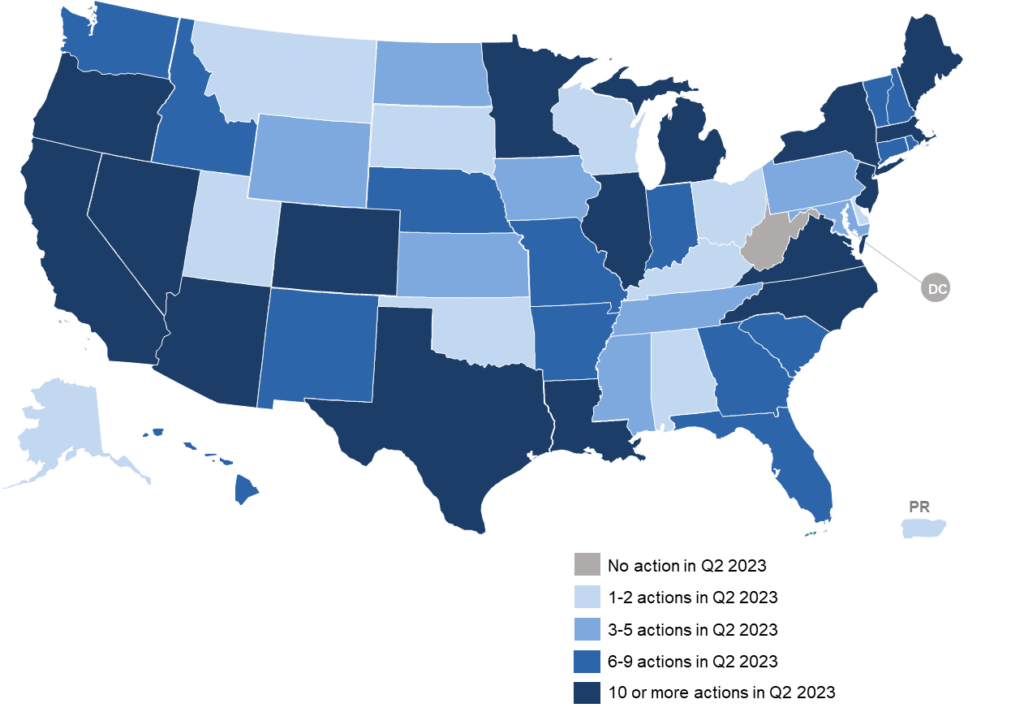50 States of Power Decarbonization Q2 2023: State Lawmakers Advance Offshore Wind and Nuclear Energy During Q2 2023
Raleigh, NC – (August 15, 2023) The N.C. Clean Energy Technology Center (NCCETC) released its Q2 2023 edition of the 50 States of Power Decarbonization. The quarterly series provides updates on state and utility actions pertaining to clean energy targets, emission reduction targets and carbon policies, generation planning and procurement rules, integrated resource plans, and electric generation capacity changes (RFPs, green tariffs, power plant retirements, etc.).
The Q2 2023 report finds that 49 states, as well as Puerto Rico, took a total of 438 actions related to electric power decarbonization and resource planning during the quarter (see figure below). Among integrated resource plans recently filed or under review by regulators in Q2 2023, planned capacity additions totaled 84,224 MW for solar, 47,400 MW for wind, 30,461 for storage, and 20,172 for natural gas, while planned coal retirements totaled 31,062 MW.
Q2 2023 Action on Power Decarbonization and Resource Planning

The report discusses three trends in power decarbonization actions taken in Q2 2023: (1) state lawmakers promoting offshore wind development; (2) policymakers modifying resources eligible for compliance with clean and renewable energy targets; and (3) states investigating the feasibility of advanced nuclear for power decarbonization.
“Many states are looking to refine what technologies are and are not eligible for their clean energy targets,” observed Rebekah de la Mora, Policy Analyst at NCCETC. “Most of the eligibility changes relate to biomass, hydroelectric, and fission nuclear energy, but some states are also redefining nuclear energy to include fusion because of recent scientific advancements.”
The report notes the top five policy developments of Q2 2023 were:
- Maryland lawmakers increasing the state’s offshore wind deployment target;
- Colorado legislators adopting greenhouse gas emission reduction targets;
- South Carolina regulators directing Dominion Energy to develop a competitive procurement program for renewable energy;
- Connecticut lawmakers expanding the state’s renewable energy target to include new nuclear; and
- Florida Power & Light planning major solar capacity additions in its ten-year site plan.
“Offshore wind and nuclear energy were two technologies in focus for state lawmakers this past quarter,” said Autumn Proudlove, Associate Director of Policy & Markets at NCCETC. “Some states expanded or moved up offshore wind deployment targets, while a number of states took steps to consider or encourage advanced nuclear.”
View the 50 States of Decarbonization 2023 Q2 Executive Summary
View and Purchase the 50 States of Decarbonization 2023 Q2 Update FULL Report
View other 50 States Reports – Solar, Grid Modernization, Electric Vehicles and Decarbonization
ABOUT THE N.C. CLEAN ENERGY TECHNOLOGY CENTER
The N.C. Clean Energy Technology Center, as part of the College of Engineering at North Carolina State University, advances a sustainable energy economy by educating, demonstrating and providing support for clean energy technologies, practices and policies. It serves as a resource for innovative, sustainable energy technologies through technology demonstration, technical assistance, outreach and training. For more information about the Center, visit: http://www.nccleantech.
Media Contact: Shannon Helm, shannon_helm@ncsu.edu